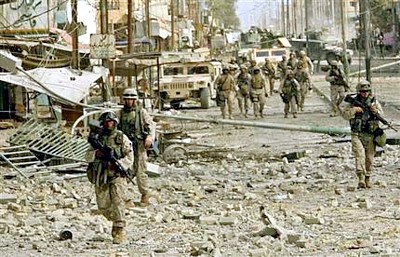Pentagon Study to recommend troop increase

The Pentagon's closely guarded review of how to improve the situation in Iraq has outlined three basic options: Send in more troops, shrink the force but stay longer, or pull out, according to senior defense officials.
Insiders have dubbed the options "Go Big," "Go Long" and "Go Home." The group conducting the review is likely to recommend a combination of a small, short-term increase in U.S. troops and a long-term commitment to stepped-up training and advising of Iraqi forces, the officials said.
The military's study, commissioned by Joint Chiefs of Staff Chairman Gen. Peter Pace, comes at a time when escalating violence is causing Iraq policy to be reconsidered by both the White House and the congressionally chartered, bipartisan Iraq Study Group. Pace's effort will feed into the White House review, but military officials have made it clear they are operating independently.
The Pentagon group's proceedings are so secret that officials asked to help it have not even been told its title or mandate. But in recent days the circle of those with knowledge of its deliberations has widened beyond a narrow group working for the Joint Chiefs of Staff.
"Go Big," the first option, originally contemplated a large increase in U.S. troops in Iraq to try to break the cycle of sectarian and insurgent violence. A classic counterinsurgency campaign, though, would require several hundred thousand additional U.S. and Iraqi soldiers as well as heavily armed Iraqi police. That option has been all but rejected by the study group, which concluded that there are not enough troops in the U.S. military and not enough effective Iraqi forces, said sources who have been informally briefed on the review.
The sources insisted on anonymity because no one at the Pentagon has been permitted to discuss the review with outsiders. The review group is led by three high-profile colonels -- H.R. McMaster and Peter Mansoor of the Army, and Thomas C. Greenwood of the Marine Corps. None of them would comment for this article.
Spokesmen for the chairman and vice chairman of the Joint Chiefs did not respond to calls or e-mails seeking comment.
"Go Home," the third option, calls for a swift withdrawal of U.S. troops. It was rejected by the Pentagon group as likely to push Iraq directly into a full-blown and bloody civil war.
The group has devised a hybrid plan that combines part of the first option with the second one -- "Go Long" -- and calls for cutting the U.S. combat presence in favor of a long-term expansion of the training and advisory efforts. Under this mixture of options, which is gaining favor inside the military, the U.S. presence in Iraq, currently about 140,000 troops, would be boosted by 20,000 to 30,000 for a short period, the officials said.
The purpose of the temporary but notable increase, they said, would be twofold: To do as much as possible to curtail sectarian violence, and also to signal to the Iraqi government and public that the shift to a "Go Long" option that aims to eventually cut the U.S. presence is not a disguised form of withdrawal.
Even so, there is concern that such a radical shift in the U.S. posture in Iraq could further damage the standing of its government, which U.S. officials worry is already shaky. Under the hybrid plan, the short increase in U.S. troop levels would be followed by a long-term plan to radically cut the presence, perhaps to 60,000 troops.
That combination plan, which one defense official called "Go Big but Short While Transitioning to Go Long," could backfire if Iraqis suspect it is really a way for the United States to moonwalk out of Iraq -- that is, to imitate singer Michael Jackson's trademark move of appearing to move forward while actually sliding backward. "If we commit to that concept, we have to accept upfront that it might result in the opposite of what we want," the official said.
Read the rest at the Washington Post
Related Link:
Two Panels Urgently Seek Iraq Solutions
Related Link:
Bush, in visit to Vietnam, says we'll win in Iraq "unless we quit"
Related Link:
2,200 more reserve force Marines heading to Anbar
Related Link:
Debate Grows Over Beefing Up U.S. Force in Iraq
Related Link:
Marines in Iraq Expanding Adviser Teams
Related Link:
Pentagon: 57,000 troops to deploy early next year
Related Link:
Report: Bush plans "last big push"; Baker commission to comply
Related Link:
New Iraq deployments could stretch Reserve Force
Related Link:
Army seeks to increase rotation through reassignment of specialists to 'high-demand roles'
Related Link:
Report: U.S. building massive permanent base in north Iraq
Related Link:
Marines plan recalling reserve combat battalions for 2nd tours in 2008
Related Link:
Secretary of AF: Airmen to remain in Iraq past 2010
Related Link:
Army: Troops to stay in Iraq until 2010
Related Link:
Expert: Iraq army has only 50% chance of success, no U.S. troop reductions foreseeable

<< Home